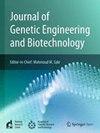标度密码子使用相似性指数:作物植物的综合资源
IF 2.8
Q3 Biochemistry, Genetics and Molecular Biology
Journal of Genetic Engineering and Biotechnology
Pub Date : 2024-11-13
DOI:10.1016/j.jgeb.2024.100441
引用次数: 0
摘要
在过去的三十年中,物种特异性密码子使用偏差已被用于优化异源基因在目标宿主中的表达。然而,由于 DNA 合成费用过高,为多个物种合成密码子优化基因是不可能实现的。为了应对这一挑战,将密码子用法相似的物种分组,可以减少对特定物种密码子优化基因合成的需求。我们引入了标度密码子使用相似性(SCUS)指数,根据密码子使用情况对物种相似性评估进行标准化。通过分析来自 13 个科的 77 个植物核基因组的 SCUS 指数,我们确定了密码子使用模式和相似性。我们开发了一个在线 SCUS 指数数据库和一个共识相对同义密码子使用率(CRSCU)计算器,可在 https://pcud.plantcodon.info 上查阅。CRSCU 计算器有助于确定两个或多个物种之间最合适的密码子使用模式。SCUS 指数和 CRSCU 计算器将促进多物种表达系统的开发,使单个合成基因在不同作物物种间高效表达成为可能。这项创新为在不同作物物种间进行经济高效的异源基因表达铺平了道路。本文章由计算机程序翻译,如有差异,请以英文原文为准。
Scaled codon usage similarity index: A comprehensive resource for crop plants
Over the past three decades species-specific codon usage bias has been used to optimize heterologous gene expression in the target host. However, synthesizing codon optimized gene for multiple species is not achievable due to the prohibitive expense of DNA synthesis. To address this challenge, grouping species with similar codon usage can reduce the need for species-specific codon optimised gene synthesis. We introduced Scaled Codon Usage Similarity (SCUS) index to standardize species similarity assessments based on codon usage profiles. By analysing the SCUS index of 77 plant nuclear genomes from 13 families, we identified codon usage patterns and similarities. We developed an online SCUS index database and a Consensus Relative Synonymous Codon Usage (CRSCU) calculator, available at https://pcud.plantcodon.info. The CRSCU calculator helps determine the most suitable codon usage pattern among two or more species. The SCUS index and CRSCU calculator will facilitate the development of multi-species expression systems, enabling the efficient expression of a single synthetic gene across various crop species. This innovation paves the way for cost-effective and efficient heterologous gene expression across diverse crop species.
求助全文
通过发布文献求助,成功后即可免费获取论文全文。
去求助
来源期刊

Journal of Genetic Engineering and Biotechnology
Biochemistry, Genetics and Molecular Biology-Biotechnology
CiteScore
5.70
自引率
5.70%
发文量
159
审稿时长
16 weeks
期刊介绍:
Journal of genetic engineering and biotechnology is devoted to rapid publication of full-length research papers that leads to significant contribution in advancing knowledge in genetic engineering and biotechnology and provide novel perspectives in this research area. JGEB includes all major themes related to genetic engineering and recombinant DNA. The area of interest of JGEB includes but not restricted to: •Plant genetics •Animal genetics •Bacterial enzymes •Agricultural Biotechnology, •Biochemistry, •Biophysics, •Bioinformatics, •Environmental Biotechnology, •Industrial Biotechnology, •Microbial biotechnology, •Medical Biotechnology, •Bioenergy, Biosafety, •Biosecurity, •Bioethics, •GMOS, •Genomic, •Proteomic JGEB accepts
 求助内容:
求助内容: 应助结果提醒方式:
应助结果提醒方式:


